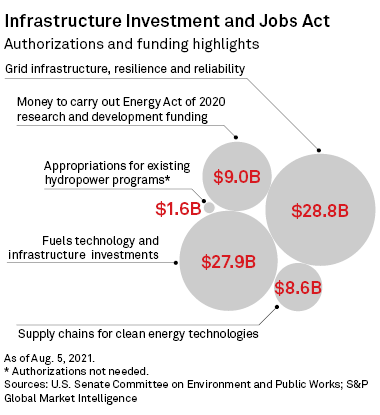Featured Topics
Featured Products
Events
S&P Global Offerings
Featured Topics
Featured Products
Events
S&P Global Offerings
Featured Topics
Featured Products
Events
S&P Global Offerings
Featured Topics
Featured Products
Events
Financial and Market intelligence
Fundamental & Alternative Datasets
Government & Defense
Professional Services
Banking & Capital Markets
Economy & Finance
Energy Transition & Sustainability
Technology & Innovation
Podcasts & Newsletters
Financial and Market intelligence
Fundamental & Alternative Datasets
Government & Defense
Professional Services
Banking & Capital Markets
Economy & Finance
Energy Transition & Sustainability
Technology & Innovation
Podcasts & Newsletters
10 Aug, 2021
The U.S. Senate passed a massive bipartisan infrastructure bill Aug. 10 partly aimed at supporting the country's transition to cleaner energy generation and vehicle electrification.
 |
The Senate voted 69-30 to pass the $1.0 trillion Infrastructure Investment and Jobs Act, which would provide $550 billion in new government spending to rebuild roads, bridges and other infrastructure and fund climate and clean energy programs.
The roughly 2,700-page bill contains dozens of energy, critical minerals and climate provisions, with transmission policy being a particular focus.
The bill would clarify that the Federal Energy Regulatory Commission can approve the construction of power lines in national interest electric transmission corridors in some instances even if a state rejects or fails to act on an application. The legislation would also allow the federal government to be an anchor tenant in new transmission projects before transferring its share of the power line to private entities.
Another significant piece of the bill would provide financial incentives to nuclear plants at risk of early closure for economic reasons. The credits cannot exceed the average projected annual operating loss, in dollars per megawatt-hour, that the plant operator expects to incur across the life of the program. The program would be funded at $6 billion across fiscal years 2022 through 2026.
Although the proposal could support some struggling nuclear plants, Exelon Corp. said the Senate bill, if enacted, would not be enough to save the company's Byron and Dresden plants in Illinois from their scheduled closure this fall.
The wide-ranging Senate bill also seeks to fund hydrogen, carbon capture and other clean energy demonstration projects, improve mapping and production of critical minerals, provide money to clean up orphaned oil and gas wells and abandoned mines, and support programs to encourage building electrification.
Furthermore, the Infrastructure Investment and Jobs Act would provide billions of dollars to deploy electric vehicle charging stations and electric and lower-emitting school buses. But clean transportation advocates expressed disappointment, with the bill's proposed funding for vehicle electrification falling far short of the $174 billion for EV expansion that Biden called for in his infrastructure plan released in late March.
What comes next
The legislation now heads to the U.S. House of Representatives for consideration.
The Senate bill is a "very strongly bipartisan package," making its chance of success strong in the narrowly divided House, said Sasha Mackler, executive director of the Bipartisan Policy Center's Energy Project.
But the House's Democratic leaders could face "a real balancing act" getting progressive members of their caucus to back the bill while not dissuading GOP lawmakers whose support may be crucial to its passage, Mackler said.
House Speaker Nancy Pelosi, D-Calif., said she wants to take up the Senate's bipartisan bill alongside a budget resolution that would direct relevant committees to draft more aggressive climate and clean energy policies. The Senate Budget Committee Aug. 9 released a $3.5 trillion budget resolution that would direct the establishment of a "clean electricity payment program," fees on methane emissions and carbon-intensive imports, and expanded tax incentives for clean energy technologies, among other things.
The Senate is set to vote on the budget resolution in the coming days, after which it would head to the House. If both chambers approve the resolution, committees of jurisdiction in the Senate and House can start drafting legislation to implement the reconciliation process.
The outcome of that process could affect the Senate bipartisan bill's success in the House. Progressive Democrats have said they will only support the bipartisan package if more sweeping climate measures are assured in the reconciliation bill.
At the same time, some Republican lawmakers are resistant to backing a bipartisan package that is tied to a much larger reconciliation package whose energy and climate programs could hurt fossil fuels.
"There's a lot of standing on the razer's edge here," said Mackler, but "I do see a path forward" for the House to pass the bipartisan bill.
With the House in recess until September, the lower chamber will likely not take up the Senate's bipartisan bill or budget resolution for several weeks.

